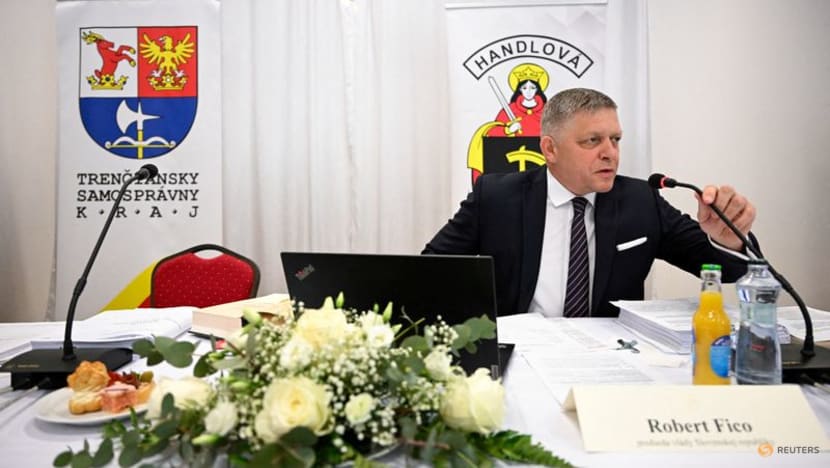Slovakia remains bitterly divided after assassination attempt on PM
Slovak Prime Minister Robert Fico has long been a controversial figure, and has been accused of fanning the flames of political hatred in the eastern European country.

Slovak Prime Minister Robert Fico attends a government meeting, before a shooting incident where he was wounded, in Handlova, Slovakia, May 15, 2024. (Photo: Reuters/Radovan Stoklasa)

This audio is generated by an AI tool.
SLOVAKIA: A brief political truce that emerged after Slovak Prime Minister Robert Fico was shot four times last month has given way to a bitter blame game.
The small eastern European country remains divided and tense, a week after Mr Fico was released from hospital.
The assassination attempt was the first on a Slovak leader in the nation’s 30-year history, and the first on the continent in more than two decades.
For many, the May 15 attack embodies the deep wounds of escalating polarisation that has plagued Slovakia for years.
Authorities said the shooting was politically motivated.
The alleged perpetrator, identified by Slovak media as 71-year-old poet Juraj Cintula, had a patchy political history, supporting a range of parties in the country. He has been charged with premeditated attempted murder and remanded in custody.
The attempt on Mr Fico’s life came as his government sought to push several controversial changes, such as shutting down Slovakia’s Special Prosecutor’s Office – which investigates high-level corruption – and taking control of state media.
Experts said that such measures are only deepening divisions.
“It provokes, of course, disagreement from the opposition, from supporters of opposition, from media, from civil society,” said president of Slovak think tank Institute for Public Affairs Grigorij Mesežnikov.
“If the government continues with these policies, which are problematic from the point of view of the functionality of law enforcement, rule of law, freedom of media, division of power and civil society development, then I think that unfortunately, this polarisation will continue,” he added.
CONTROVERSIAL FIGURE
Mr Fico has long been a controversial figure dominating politics in Slovakia, which has a population of more than 5.4 million.
Described as a left-wing populist, the 59-year-old was re-elected for a third term last year.
He has been fiercely critical of the press and the European Union.
He has pledged to end military support for neighbouring Ukraine and has been open to improving ties with Russia.
Domestically, he has been accused of fanning the flames of political hatred in Slovakia.
Just a month before the attempt on his life, he lashed out at the press and Slovakia’s opposition, accusing them of spreading hate and chillingly predicting that it could lead to the murder of a senior government figure.
On Wednesday, in his first address since the shooting, he again blamed his opponents for fostering the "hatred" that led to the attack.
When CNA visited the town of Handlova where the shooting took place, residents told CNA that they, and Slovaks in general, were not the source of their country’s divisions.
Local business owner Radoslav Mihalus said: “People here are not divided, but politicians make us divided – but people here are not divided. People here are friends.”
Related:
POLITICAL UNITY SHORT-LIVED
In the wake of the attack, Slovak members of parliament came together in a landmark show of political unity to condemn it, unanimously calling for respect for the democratically elected government.
However, that unity was short-lived.
Mr Lubos Blaha, a leading member of Mr Fico's governing SMER party, blamed the press and Slovakia’s opposition parties for the attack just two weeks after the shooting.
Speaking while on the campaign trail for the European parliamentary election, which kicks off on Thursday (Jun 6) and closes on Sunday, Mr Blaha claimed it had been “four years of hatred against Fico and against SMER”.
He told CNA: “People feel the hatred again, the emotion of anger, of injustice, because … our prime minister, our friend Robert, was almost killed. And suddenly the liberal media and the political opposition are blaming us – that we are the reason why he was almost killed?”
“This is ridiculous, and that's why we ask for redemption, kind of say sorry from the side of the liberal camp,” he added.
Meanwhile, the pro-European opposition Progressive Slovakia party countered that SMER has no desire to unite the country.
Ms Lucia Yar, who is running in the European election under the Progressive Slovakia banner, noted that apart from the assassination attempt on Mr Fico, a journalist and two men from the LGBTQ community have been killed in recent years.
“The emotions are extremely high and it is a responsibility of politicians to calm the situation down and to use language that is appropriate, not one that is dividing,” she told CNA.
Other candidates said they have had to ramp up their security, out of fear for their personal safety.
As Mr Fico recovers, Slovakia remains on edge, still far from healing its political divisions.














